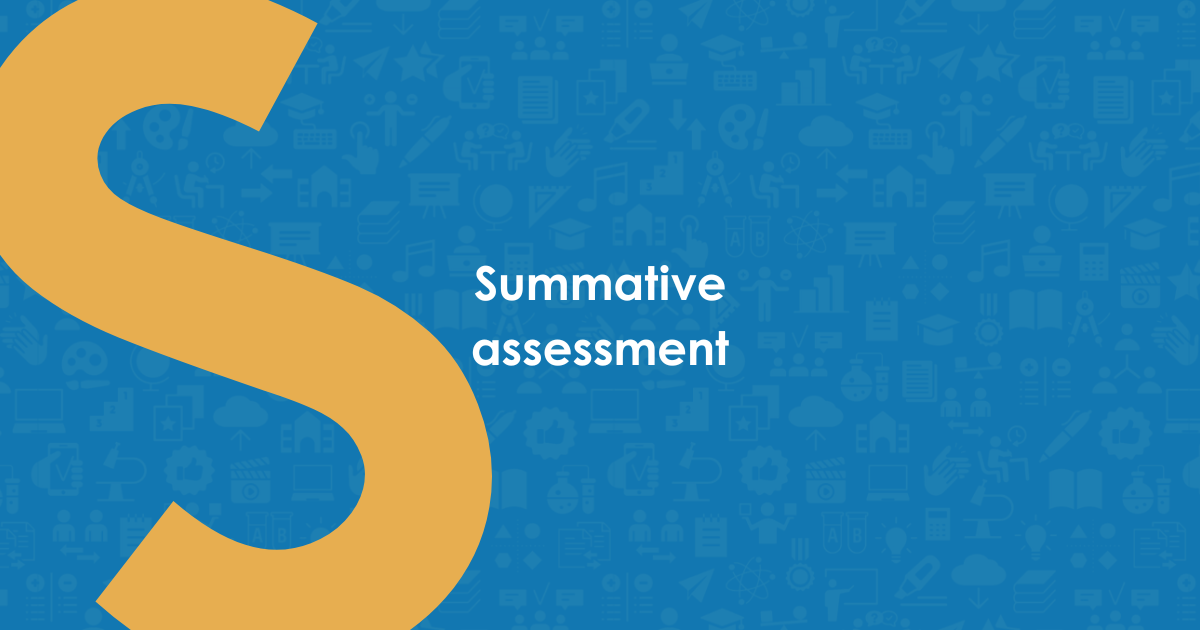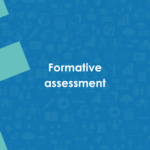
10 Jun Summative assessment
You have not yet started your teaching or you already get the question: ‘Will this be assessed?’ Why does it always have to be about the exam or test? There has been a clear movement in recent years to give more attention to the learning function of exams, partly from the hope that students will no longer focus so much on the final result but more on the learning process. At the same time, we will still have to make a decision about student competence from time to time. So how do we do this? We dive into the concept of summative assessment.
Formative and summative
Formative and summative assessment are still sometimes seen as opposites. Summative assessments are about forming a final judgement: can a student do something, and to what extent? Valuations are attached to these exams or tests in the form of credits or (eventually) diplomas. If you do not pass them, you cannot continue your studies. Summative assessments are then opposed to formative assessments that are about learning rather than the final assessment¹. In practice, it is not helpful to see formative and summative as two opposing forms of evaluation. Indeed, an exam or test without a final assessment is not necessarily formative. Formative is much more a didactic approach used as a means of learning. Researchers have deliberately abandoned the term ‘formative assessment’ because it still too often gives the implicit message that it is always and only about evaluating or testing. Researchers prefer to use the term ‘formative practice’. Read more about formative practice here.
How do we give the judgement?
All right, back to summative assessment. So we give a final judgement, and such a judgement can be given in different ways. Usually, we give grades. However, giving grades is somewhat under discussion. In the Netherlands, for instance, the book ‘Is het voor een cijfer?‘ (Is it for a grade?) was recently published, in which investigative journalist Johannes Visser takes a critical look at the current test culture in the Netherlands. Indeed, there are several disadvantages to giving grades. For instance, they lower intrinsic motivation, shift students’ focus from learning to performance, create unhealthy competition, and cause stress and anxiety². Furthermore, summative assessments with grades tend to lead to superficial learning³. This means that students mainly learn for the exam and do not process information deeply enough to have really internalised it. This is where the question ‘Is this being assessed?’ arises.
So do all these negative effects mean we should not give grades? Not necessarily. In some cases, grades do have a function. First, it is a very efficient way to distinguish levels of achievement. If your goal is to differentiate students in ability level for selection, then with grades you have a good tool. Because you put everyone on a similar scale, it can ensure fair judgements. Indeed, grades were once devised to make assessment fairer². You can also compare groups of students more easily. Grades also make it possible to calculate class averages that can say something about the overall learning trend at a school. Of course, these applications require reliable and valid assessment, and that does not always happen⁴.
Gradeless assessment
What if you want to get rid of grades? There are other ways you can do summative assessment, although again no means proves perfect. Research has been done on what happens when you evaluate without giving grades. The absence of grades generally results in less superficial learning, less stress and more motivation². It is not yet entirely clear what a lack of grades does to study performance. There are concerns that study performance would decrease because students no longer feel great pressure to achieve many grades⁴. The results on this are just not unambiguous and sometimes there is still a lack of sufficient data to draw good conclusions². Also, not every study can immediately be translated to the Dutch/Flemish context⁴.
Alternatives seem promising, but here too there are issues to consider. There are examples of schools only giving students a kind of CV upon graduation. This does prove difficult to implement on a large scale⁵. Moving to only giving a pass/fail, the benefits of going grade-free may be countered by the prevailing status quo. In an educational institution where grades are still the norm, students may pay less attention to a grade-less subject⁵.
In any case, in an educational institution or subject that switches to grade-less assessment altogether, much attention will have to be paid by both teachers and students to getting used to this way of working²,⁴. After all, we are all used to working with grades. The danger is that you still want to make a distinction for people who excel, for example, which means you will still create a kind of scale of different performance levels. If you start working with stars or letters, you quickly return to a points system, with the accompanying thoughts such as ‘I only have a B’. Basically, you are then back to square one.
So what now?
Ultimately, you can’t get away from giving judgement on a student’s performance. After all, you will have to ensure that someone reaches the standard required for a diploma. Summative assessments also enable you to guarantee educational quality by comparing results over years. So the negative effects of summative assessments will always exist to some extent.
You can, however, think about when and how often you use these evaluations and what form you choose. By doing so, you limit the negative effects where possible. Perhaps in your situation it is possible to evaluate less and still get a picture of student learning through formative practice. But if you want to select students by performance level, for example, you might want to use grades instead.
In all cases, you want to ensure that a summative assessment is reliable and valid. With the more complex tasks in higher education, comparative judgement is a suitable method to do this. This assessment method leads to high validity and reliability⁶,⁷. Comparative judgement works from comparison, a natural process by which you make more consistent decisions than by using a criteria list. A final assessment in this way is also not dependent on one teacher’s assessment. By comparing together, you construct a ranking from the least good to the best work. You can then easily convert this ranking into grades.
Want to know more about comparative judgement? Download the e-book, read more about the background of this method or contact us with your specific questions.
Literature
¹Black, P., & Wiliam, D. (2009). Developing the theory of formative assessment. Educational Assessment, Evaluation & Accountability, 21, 5–31. https://doi.org/10.1007/s11092-008-9068-5
²Kjærgaard, A., Buhl-Wiggers, J., & Mikkelsen, E. N. (2023). Does gradeless learning affect students’ academic performance? A study of effects over time. Studies in Higher Education. https://doi.org/10.1080/03075079.2023.2233007
³Biggs, J. (1998). Assessment and classroom learning: A role for summative assessment? Assessment in Education: Principles, Policy & Practice, 5(1), 103-110. https://doi.org/10.1080/0969595980050106
⁴McMorran, C., Ragupathi, K., & Luo, S. (2015). Assessment and learning without grades? Motivations and concerns with implementing gradeless learning in higher education. Assessment & Evaluation in Higher Education, 42(3), 361-377. http://dx.doi.org/10.1080/02602938.2015.1114584
⁵Tannock, S. (2015): No grades in higher education now! Revisiting the place of graded assessment in the reimagination of the public university. Studies in Higher Education, 42(8), 1345-1357. http://dx.doi.org/10.1080/03075079.2015.1092131
⁶van Daal, T., Lesterhuis, M., Coertjens, L., Donche, V., & De Maeyer, S. (2019). Validity of comparative judgement to assess academic writing: Examining implications of its holistic character and building on a shared consensus. Assessment in Education: Principles, Policy & Practice, 26(1), 59-74. https://doi.org/10.1080/0969594X.2016.1253542
⁷Verhavert, S., Bouwer, R., Donche, V., & De Maeyer, S. (2019). A meta-analysis on the reliability of comparative judgement. Assessment in Education: Principles, policy & practice, 26(5), 541-562. https://doi.org/10.1080/0969594X.2019.1602027




